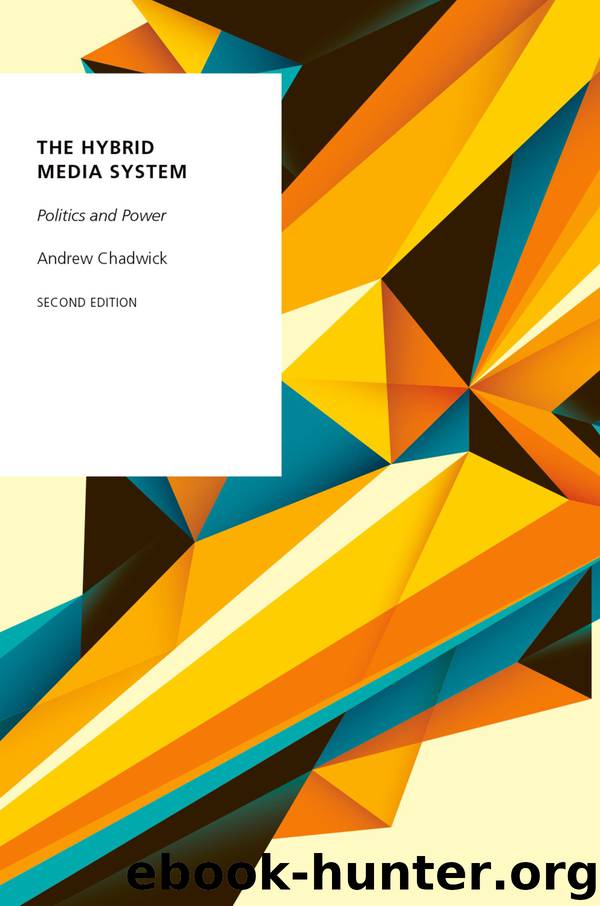The Hybrid Media System by Andrew Chadwick

Author:Andrew Chadwick
Language: eng
Format: epub
Publisher: Oxford University Press
Published: 2017-04-15T00:00:00+00:00
Fear and Loathing and “Citizen Journalism”: “Bittergate”
The Reverend Wright affair was soon joined by a further important episode illustrating the complex interdependence of older and newer media. This became known as “Bittergate” and it came as the 2008 primaries entered their final decisive phase.
During a wide-ranging discussion at a San Francisco fundraising meeting on April 6, 2008, Obama turned to discuss the plight of small-town America. He said “You go into some of these small towns in Pennsylvania, and like a lot of small towns in the Midwest, the jobs have been gone now for 25 years and nothing’s replaced them … And it’s not surprising that they get bitter, they cling to guns or religion or antipathy to people who aren’t like them or anti-immigrant sentiment or anti-trade sentiment as a way to explain their frustrations” (Fowler, 2008).
This fundraising meeting was closed to the press and the discussion was deemed “off the record.” On this rare occasion, the press staff had not enforced its own policy of recording their candidate’s every utterance (Plouffe, 2010: 216) Unknown to them, an audio recording of the meeting was being captured on a handheld voice recorder by an amateur blogger and citizen activist named Mayhill Fowler. Part of a distributed team of “amateur” citizen journalists who were following the campaign under the Huffington Post’s “Off the Bus” program, Fowler was in fact an experienced Democratic party supporter and had even donated to the campaign. Self-described as a “teacher, editor, and writer,” Fowler had followed Obama for a year, writing for her blog and filing opinion pieces for the Huffington Post, on an unpaid basis.
Fowler was not a journalist, nor was she a straightforward blogger or campaign volunteer. She had gained entry to the San Francisco event because she was known to the campaign, but she did not ask permission to record Obama’s remarks and she was not treated as a journalist by the press staff. Fowler had her own personal blog, but her involvement with the Huffington Post meant that there soon followed some internal editorial discussions with Post editor Arianna Huffington about the news value of the material Fowler had gathered. Following those editorial discussions, Huffington authorized publication in the certain knowledge that Obama’s remarks would have a huge impact on the news. “We recognized it was a politically volatile story and thought it would create news,” said Marc Cooper, one of Huffington Post’s deputy editors (Bradley, 2008). Cooper was right. CNN International picked up the story and started to broadcast packages featuring the most controversial section of Fowler’s audio file. Within a few hours the story had spread across the media system to cable and national network news shows, blogs, newspaper websites, Facebook, and Twitter. It played a major role in the Pennsylvania primary’s televised debate, as moderators Charles Gibson and George Stephanopoulos repeatedly questioned Obama about his comments.
Bittergate reveals further key aspects of the hybrid media system in political campaigns. Anita Dunn, chief communications officer to the Obama campaign has described 2008 as a tipping point in news media’s treatment of politics.
Download
This site does not store any files on its server. We only index and link to content provided by other sites. Please contact the content providers to delete copyright contents if any and email us, we'll remove relevant links or contents immediately.
The Secret History by Donna Tartt(19097)
The Social Justice Warrior Handbook by Lisa De Pasquale(12192)
Thirteen Reasons Why by Jay Asher(8914)
This Is How You Lose Her by Junot Diaz(6890)
Weapons of Math Destruction by Cathy O'Neil(6282)
Zero to One by Peter Thiel(5805)
Beartown by Fredrik Backman(5761)
The Myth of the Strong Leader by Archie Brown(5511)
The Fire Next Time by James Baldwin(5450)
How Democracies Die by Steven Levitsky & Daniel Ziblatt(5221)
Promise Me, Dad by Joe Biden(5155)
Stone's Rules by Roger Stone(5089)
A Higher Loyalty: Truth, Lies, and Leadership by James Comey(4965)
100 Deadly Skills by Clint Emerson(4929)
Rise and Kill First by Ronen Bergman(4792)
Secrecy World by Jake Bernstein(4755)
The David Icke Guide to the Global Conspiracy (and how to end it) by David Icke(4721)
The Farm by Tom Rob Smith(4516)
The Doomsday Machine by Daniel Ellsberg(4491)
